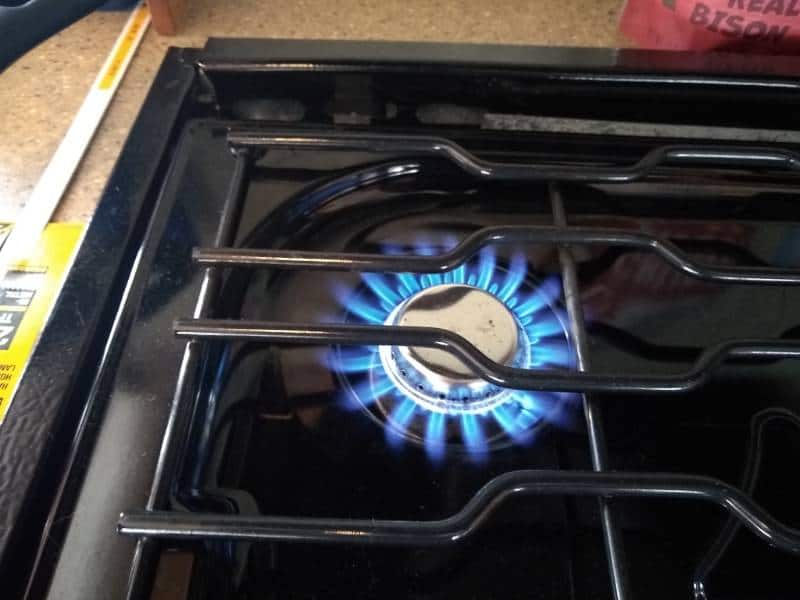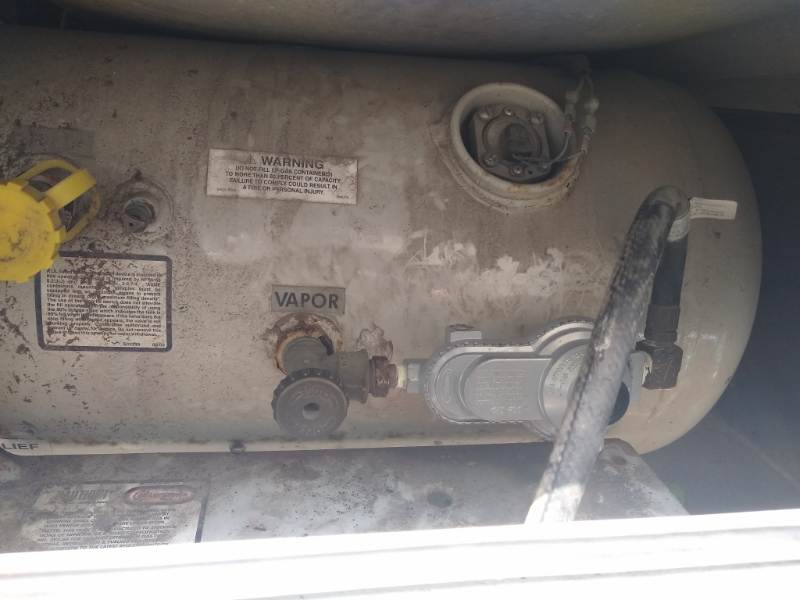“How long will my propane tanks last?”
I have the answer.
3 days, 2 hours and 42 minutes.
Don’t trust me? Good. Because there is no one-size-fits-all answer to your question. Thankfully, you can easily answer this question for yourself. And not to get all zen on you, but only you can know …
How Long Will an RV Propane Tank Last? – The Grab-and-Go Answer
Propane consumption varies widely by season, RV, and your camping style. If you’re too impatient to digest the rest of this article, here’s the snackable grab-and-go answer:
The average camper will consume about 1.5 “lbs” of propane per day. That means a single 20-lb propane tank should last two weeks of full-time camping or more.
By “lbs,” I’m referring to nominal tank pounds, e.g., 20-lb or 30-lb tank. You don’t actually have to calculate the pound-weight of your fuel!
Example: You have a single 20-lb tank. 20 lbs divided by 1.5 = 13.3 days, so as I said, your tank should last at least two weeks!
Another example: You have dual 30-lb tanks for a total of 60 lbs capacity. 60 divided by 1.5 = 40 days – that’s almost 6 weeks of full-time camping!
Obviously, this number is only a gross average. Boondocking during a frigid Vermont winter? Expect less time. Enjoying the Florida sun as a snowbird with full 50A hookups? Expect more time!
Psst … if “rules of thumb” aren’t good enough for you, then I invite you to visit our companion website, Changing Gears, for an RV propane life calculator.
New to Propane? Start Here!

If you’re not familiar with the basics of an RV propane system, please read my RV 101 propane article here.
Also, if you plan on getting handsy with your propane system, please read the LP safety advice from myself and full-time RVer Michael Huff here.
RVs use propane for two basic uses:
- Create heat
- Refrigeration*
*Some modern RVs no longer use absorption refrigerators, just DC-only or 2-way AC/DC compressor refrigerators.
Common appliances that consume propane include:
- Refrigerator
- Water heater
- Stove cooktop
- Gas oven
- Furnace
- Catalytic heater
How to Calculate How Long an RV Propane Tank Will Last
If you’re scared of math, just imagine It the Clown teaching a math class, and realize it could be so much worse.
You don’t need a large mental abacus to figure out how long your RV propane tanks will last.
All you need to know are two things:
- What size propane tanks you have
- The BTU ratings of your propane-consuming appliances
1. What Size Are My Propane Tanks?

If you don’t know where your propane tanks are, here’s a hint:
- On a travel trailer, they are usually on the trailer frame tongue.
- On a 5th wheel, they are usually behind the front wall underneath the overhang.
- On a motorhome, they are usually in the basement, often on the curb-side.
Many tanks will have a label or embossed letters stating their size.
If you’re having trouble finding the size of your tank, just visit this link for pictures and sizes of standard DOT propane tanks. Most RVs will either have 20, 30/33, or 40-lb canisters.
Meanwhile, motorhomes typically have ASME tanks ranging from 20 to 100 lbs capacity. ASME tank sizes aren’t as standardized as consumer DOT sizes.
If you have multiple tanks, just add the capacity of the two or three together!
2. What Is My BTU Demand?
Step A – Find BTU Ratings
You need to figure out how many “BTUs” your appliances use.
You can read the BTU rating on the appliance itself, inside its Installation Manual, or on its online product listing page.
For instance:
- Furnace BTU input: 20,000 BTU
- Stove burner: 6,000 BTU
- Fridge on LP mode: 1,050 BTU
- Water heater on LP mode: 10,000 BTU
TOTAL: 27,050 BTUs
Note that you’re looking for input BTUs, not output BTU!
Also, note that we’re simplifying some numbers. For instance, a 6,000-BTU stove burner can only put out 6,000 BTU at max capacity. It will consume less propane on simmer than on boiling, for instance. But unless you want to do the hard work of measuring actual consumption, using the sticker value is a quick conservative substitute.
Step B – Estimate Run-Time
Next, estimate how many hours you’ll run each appliance in a 24-hour day.
Note that you’re looking for continuous run-time! Just because you leave your furnace “on” all night doesn’t mean it runs continuously! It’ll run 10 minutes, then shut off for 45, then turn on for 12 minutes, etc.
Example: If your furnace is “on” for nine hours but only runs 10 minutes every hour, then the total run time is 9 x 10 = 90 minutes = 1.5 hours, not 9 hours!
Here’s a full example:
- Furnace: 2 hrs
- Stove: 30 min
- Water heater (in LP mode): 30 min
- Fridge: 4 hrs (in LP cooling mode)
Total, that’s 20,000 X 2 + 6,000 X 0.5 + 10,000 x 0.5 + 1050 X 4 = 52,200 BTUs (Total Demand)
A pound of propane contains about 21,500 BTUs.
(For reference, a gallon of propane weighs about 4.2 lbs and contains an estimated 92,000 BTUs).
You want to know how many pounds of propane your appliances have consumed!
Just divide your total BTU demand by 21,500.
So 52,20 / 21,500 = 2.4 lbs.
Please note this is ACTUAl pounds of propane fuel, not nominal tank pounds! (This because a “20-lb” tank of propane really only holds 17 lbs of propane. Hey, don’t blame me, that’s just how it is!)
The calculations above describe a fairly typical day of camping in autumn weather (furnace at night, evening shower, meals on the cooktop, washing dishes, using the fridge, etc.).
How to Make My RV Propane Last Longer?
You may be wondering, “How can I make my propane last longer?”
If you are boondocking or dry camping for longer periods, you don’t want to pack up camp every week or two just to refill your tanks. And if you have an ASME tank, you don’t have the option of exchanging or refilling a portable tank.
Let me give you a few tips for conserving propane in your RV.
Wear a Sweater
Your furnace gobbles up quite a few gallons of propane! It’s the most propane-hungry appliance in your RV. If you can stand the cold, wear a sweater or double up the blankets. Please keep your RV at least 40-50 degrees inside to prevent pipes freezing, however.
Invest in Solar Power
With a large enough (400W) solar panel system, upgraded battery bank and inverter, you could run your water heater or other appliances off solar power. This is an expensive upgrade, but solar comes with many other benefits as well.
Upgrade Your Fridge
Again, this is not a cheap option. But a highly-efficient AC/DC all-electric compressor refrigerator doesn’t consume a single drop of propane. And unlike a traditional absorption refrigerator, a finicky contraption that doesn’t like high altitude or being off-level, compression refrigerators are much more forgiving and reliable.
Add RV Skirting
If you’re camping in winter, you should place a skirt or other air barrier around the base of your RV. This creates a semi-heated crawl space of sorts that helps your RV retain its interior heat.
Shower Only When Necessary
Heating water requires a lot of energy. Boiling water or taking hot showers eats up a lot of propane! Consider taking Navy-style or cold water immersion showers. Or in the words of Secondhand Lions, “Better yet, learn to do without.”
And best of all, you don’t have to worry about propane going bad over time! Unlike gasoline and other fuel, propane doesn’t really have an expiration date. Save it for when you need it.
Leave a Reply